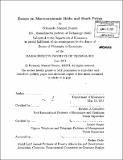| dc.contributor.advisor | Ricardo J. Caballero and Leonid Kogan. | en_US |
| dc.contributor.author | Duarte, Fernando Manuel | en_US |
| dc.contributor.other | Massachusetts Institute of Technology. Dept. of Economics. | en_US |
| dc.date.accessioned | 2011-08-30T15:40:47Z | |
| dc.date.available | 2011-08-30T15:40:47Z | |
| dc.date.copyright | 2011 | en_US |
| dc.date.issued | 2011 | en_US |
| dc.identifier.uri | http://hdl.handle.net/1721.1/65483 | |
| dc.description | Thesis (Ph. D.)--Massachusetts Institute of Technology, Dept. of Economics, 2011. | en_US |
| dc.description | Cataloged from PDF version of thesis. | en_US |
| dc.description | Includes bibliographical references. | en_US |
| dc.description.abstract | In this thesis, I study the relationship between macroeconomic risks and asset prices. In the first chapter, I establish that inflation risk is priced in the cross-section of stock returns: stocks that have low returns during inflationary times command a risk premium. I estimate a market price of inflation risk that is comparable in magnitude to the price of risk for the aggregate market. Inflation is therefore a key determinant of risk in the cross-section of stocks. The inflation premium cannot be explained by either the Fama-French factors or industry effects. Instead, I argue the premium arises because high inflation lowers expectations of future real consumption growth. To formalize and test this hypothesis, I develop a consumption-based general equilibrium model. The model generates a price of inflation risk consistent with my empirical estimates, while simultaneously matching the joint dynamics of consumption and inflation, the aggregate equity premium, and the level and slope of the yield curve. In the second chapter, with L. Kogan and Dmitry Livdan, we study the relation between returns on the aggregate stock market and aggregate real investment. While it is well known that aggregate investment rate is negatively correlated with subsequent excess stock market returns, we find that it is positively correlated with future stock market volatility. Thus, conditionally on past aggregate investment, the mean-variance tradeoff in aggregate stock returns is negative. We interpret these patterns within a general equilibrium production economy. In our model, investment is determined endogenously in response to two types of shocks: shocks to productivity and preference shocks affecting discount rates. Preference shocks affect expected stock returns, aggregate investment rate, and stock return volatility in equilibrium, helping model reproduce the empirical relations between these variables. Thus, our results emphasize that the time-varying price of aggregate risk plays and important role in shaping the aggregate investment dynamics. In the third chapter, with S. Parsa, we show a novel relation between the institutional investors' intrinsic trading frequency-a commonly used proxy for the investors's investment horizon- and the cross-section of stock returns. We show that the 20% of stocks with the lowest trading frequency earn mean returns that are 6 percentage points per year higher than the 20% of stocks that have the highest trading frequency. The magnitude and predictability of these returns persist or even increase when riskadjusted by common indicators of systematic risks such as the Fama-French, liquidity or momentum factors. Our results show that the characteristics of stockholders affect expected returns of the very securities they hold, supporting the view that heterogeneity among investors is an important dimension of asset prices. JEL classification: E31, E44, G12. | en_US |
| dc.description.statementofresponsibility | by Fernando Manuel Duarte. | en_US |
| dc.format.extent | 159 p. | en_US |
| dc.language.iso | eng | en_US |
| dc.publisher | Massachusetts Institute of Technology | en_US |
| dc.rights | M.I.T. theses are protected by
copyright. They may be viewed from this source for any purpose, but
reproduction or distribution in any format is prohibited without written
permission. See provided URL for inquiries about permission. | en_US |
| dc.rights.uri | http://dspace.mit.edu/handle/1721.1/7582 | en_US |
| dc.subject | Economics. | en_US |
| dc.title | Essays on macroeconomic risks and stock prices | en_US |
| dc.type | Thesis | en_US |
| dc.description.degree | Ph.D. | en_US |
| dc.contributor.department | Massachusetts Institute of Technology. Department of Economics | |
| dc.identifier.oclc | 746575160 | en_US |

